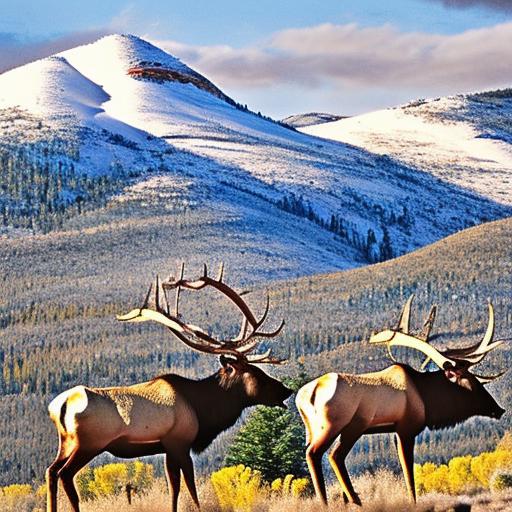Your cart is currently empty!

The Rich Tradition of White Mountain Apache Tribe Elk Hunting: A Cultural Legacy Preserved Through Time

The White Mountain Apache Tribe is a Native American tribe located in the state of Arizona. They have a rich history that dates back thousands of years, with evidence of their presence in the region as early as 300 CE. The tribe has faced many challenges throughout their history, including conflicts with European settlers and the forced relocation to reservations. Despite these challenges, the White Mountain Apache Tribe has managed to preserve their culture and traditions.
The culture of the White Mountain Apache Tribe is deeply rooted in their connection to the land and nature. They have a strong spiritual belief system that emphasizes the importance of living in harmony with the natural world. This belief system is reflected in their traditions, ceremonies, and daily practices. The tribe has a deep respect for the land and its resources, and they strive to maintain a sustainable relationship with nature.
Key Takeaways
- The White Mountain Apache Tribe has a rich cultural heritage that includes elk hunting as a significant tradition.
- Elk hunting has been a part of Apache culture for centuries, with historical roots dating back to pre-colonial times.
- Rituals and ceremonies associated with elk hunting play an important role in Apache culture and are passed down through generations.
- Women have played a crucial role in Apache elk hunting, with responsibilities ranging from preparation to participation in the hunt.
- Conservation is a key aspect of Apache elk hunting, with efforts to maintain a balance between hunting and preserving the natural environment.
The Significance of Elk Hunting in Apache Culture
Elk hunting holds great significance in Apache culture. For centuries, elk have been an important source of food for the tribe. The meat from elk provides sustenance for the community, and every part of the animal is utilized. Elk hunting also plays a crucial role in maintaining the balance of nature, as it helps regulate elk populations and prevent overgrazing.
In addition to its practical importance, elk hunting is deeply intertwined with Apache spirituality and cultural traditions. The hunt is seen as a sacred act, and it is accompanied by rituals and ceremonies that honor the animal and express gratitude for its sacrifice. These rituals serve to strengthen the bond between humans and nature, and they are passed down from generation to generation as a way of preserving Apache culture.
The Historical Roots of Apache Elk Hunting
Elk hunting has been a part of Apache culture for centuries. The tribe has developed sophisticated techniques and tools over time to ensure successful hunts. In the past, Apache hunters relied on their knowledge of elk behavior and the landscape to track and ambush their prey. They used traditional weapons such as bows and arrows, as well as traps and snares.
As the tribe interacted with other Native American groups and European settlers, they adopted new hunting techniques and tools. The introduction of horses by the Spanish in the 16th century revolutionized Apache hunting, as it allowed them to cover larger distances and pursue elk more effectively. The tribe also began using firearms in the 19th century, which further changed their hunting practices.
The Rituals and Ceremonies Associated with Elk Hunting
| Aspect | Description |
|---|---|
| Preparation | Elk hunters spend months preparing for the hunt, including scouting the area, practicing shooting, and getting in physical shape. |
| Clothing | Hunters wear specialized clothing, including camouflage, scent-blocking materials, and warm layers to stay comfortable during long hours in the field. |
| Weapons | Elk hunters typically use rifles or bows, and spend time sighting in their weapons to ensure accuracy. |
| Calls | Hunters use a variety of calls to mimic the sounds of elk, including bugles, grunts, and cow calls. |
| Rituals | Some hunters perform rituals before the hunt, such as smudging with sage or other herbs, to bring good luck and ward off evil spirits. |
| Ceremonies | Some Native American tribes have elaborate ceremonies associated with elk hunting, including dances and offerings to the spirits of the animals. |
| Tracking | Once in the field, hunters track elk using signs such as tracks, droppings, and rubs on trees. |
| Harvesting | When an elk is harvested, hunters often perform a ceremony to honor the animal and give thanks for its sacrifice. |
Rituals and ceremonies play a central role in Apache culture, and elk hunting is no exception. Before embarking on a hunt, Apache hunters engage in various rituals to seek the blessings of the spirits and ensure a successful hunt. These rituals often involve offerings and prayers, as well as dances and songs.
During the hunt itself, Apache hunters perform specific ceremonies to honor the elk and express gratitude for its sacrifice. These ceremonies are meant to show respect for the animal and acknowledge its role in sustaining the community. After a successful hunt, there is a celebration where the entire community comes together to share in the bounty of the elk.
The Role of Women in Apache Elk Hunting
While elk hunting is often associated with men, women play a crucial role in Apache elk hunting. In Apache culture, women are seen as the caretakers of the home and family, and they are responsible for processing and preserving the meat from the hunt. They also play a vital role in passing down knowledge and traditions related to elk hunting to future generations.
In addition to their domestic responsibilities, women have traditionally been involved in the actual hunting process as well. They would accompany men on hunts, providing support and assistance. Women were skilled trackers and had an intimate knowledge of the land, which made them valuable contributors to successful hunts.
The Importance of Conservation in Apache Elk Hunting

Conservation is of utmost importance to the White Mountain Apache Tribe. They recognize the need to protect the environment and wildlife to ensure the sustainability of elk hunting for future generations. The tribe has implemented various conservation efforts to preserve elk populations and their habitat.
The White Mountain Apache Tribe has established hunting regulations and quotas to prevent overhunting and maintain healthy elk populations. They also work closely with wildlife management agencies to monitor elk populations and implement conservation strategies. The tribe is actively involved in habitat restoration projects, such as reforestation and erosion control, to ensure the long-term health of the land.
The Evolution of Apache Elk Hunting Techniques and Tools
Technology has had a significant impact on elk hunting techniques and tools used by the Apache tribe. While traditional methods such as tracking and ambushing are still employed, modern technology has made hunting more efficient. The use of firearms, for example, has made it easier for hunters to take down elk from a distance.
However, the tribe recognizes the importance of preserving traditional hunting methods and techniques. Many Apache hunters still prefer to use traditional weapons such as bows and arrows, as they believe it maintains a stronger connection to their ancestors and the land. The tribe also emphasizes the importance of passing down traditional knowledge and skills to future generations.
The Economic and Social Impacts of Apache Elk Hunting
Elk hunting has significant economic benefits for the White Mountain Apache Tribe. It provides a source of income through the sale of hunting permits and licenses to non-tribal members. The revenue generated from elk hunting helps support tribal programs and services, such as education, healthcare, and infrastructure development.
In addition to its economic impact, elk hunting also has social benefits for the community. It brings people together and strengthens social bonds within the tribe. The hunt is often seen as a communal activity, with multiple families participating together. It provides an opportunity for elders to pass down knowledge and traditions to younger generations, ensuring the preservation of Apache culture.
The Challenges Facing Apache Elk Hunting Today
Elk hunting faces several challenges today, including threats to elk populations and the environment. Climate change, habitat loss, and disease are all factors that can impact elk populations and their ability to thrive. The White Mountain Apache Tribe is working to address these challenges through conservation efforts and partnerships with wildlife management agencies.
Another challenge facing elk hunting is the increasing demand for permits from non-tribal members. The tribe must carefully manage hunting quotas to ensure sustainable elk populations while also meeting the economic needs of the community. Balancing these competing interests requires careful planning and collaboration with stakeholders.
The Future of Apache Elk Hunting and the Preservation of Cultural Heritage
The future of Apache elk hunting is closely tied to the preservation of cultural heritage. The White Mountain Apache Tribe recognizes the importance of maintaining their traditions and passing them down to future generations. Elk hunting serves as a way to connect with their ancestors and the land, and it is seen as an integral part of Apache identity.
The tribe is committed to preserving their cultural heritage through elk hunting by continuing to practice traditional rituals and ceremonies. They also prioritize education and cultural programs that teach younger generations about their history, traditions, and the importance of conservation. By doing so, they hope to ensure that Apache elk hunting remains a vital part of their culture for years to come.
If you’re interested in hunting, you may also enjoy reading this article on “How to Hunt Jackrabbits” from Old Oak Syndicate. It provides valuable tips and techniques for hunting jackrabbits, which can be a thrilling and challenging experience. Whether you’re a seasoned hunter or just starting out, this article offers insights that can enhance your hunting skills. Check it out here.
FAQs
What is the White Mountain Apache Tribe?
The White Mountain Apache Tribe is a Native American tribe located in the eastern part of Arizona, USA.
What is elk hunting?
Elk hunting is the practice of hunting elk, a large species of deer, for sport or food.
What is the significance of elk hunting to the White Mountain Apache Tribe?
Elk hunting is an important cultural and traditional practice for the White Mountain Apache Tribe. It is a way for them to connect with their ancestors and maintain their way of life.
When does elk hunting season take place?
Elk hunting season varies depending on the state and tribe. In the White Mountain Apache Tribe, elk hunting season typically takes place in the fall.
Who is allowed to participate in elk hunting with the White Mountain Apache Tribe?
Elk hunting with the White Mountain Apache Tribe is typically reserved for tribal members and their families. However, non-tribal members may be allowed to participate in certain circumstances.
What are the rules and regulations for elk hunting with the White Mountain Apache Tribe?
Rules and regulations for elk hunting with the White Mountain Apache Tribe vary depending on the specific hunt and location. It is important to follow all rules and regulations to ensure the safety of all participants and the preservation of the elk population.
What is the impact of elk hunting on the White Mountain Apache Tribe?
Elk hunting is an important part of the White Mountain Apache Tribe’s culture and tradition. It provides food and resources for the tribe, as well as a way to connect with their ancestors. Additionally, elk hunting helps to manage the elk population and maintain a healthy ecosystem.

Herb has been a longtime lover of the outdoors. Whether it be hunting, camping, fishing or just getting outside to reset. Proud father and animal lover. Bourbon anyone?

by
Tags:
Comments

Categories
- Big Game Hunting (301)
- Deer (202)
- Reviews (3)
- Shooting (16)
- Slingshot (1)
- Small Game Hunting (42)
- Upland Hunting (126)
- Waterfowl Hunting (3)





Leave a Reply